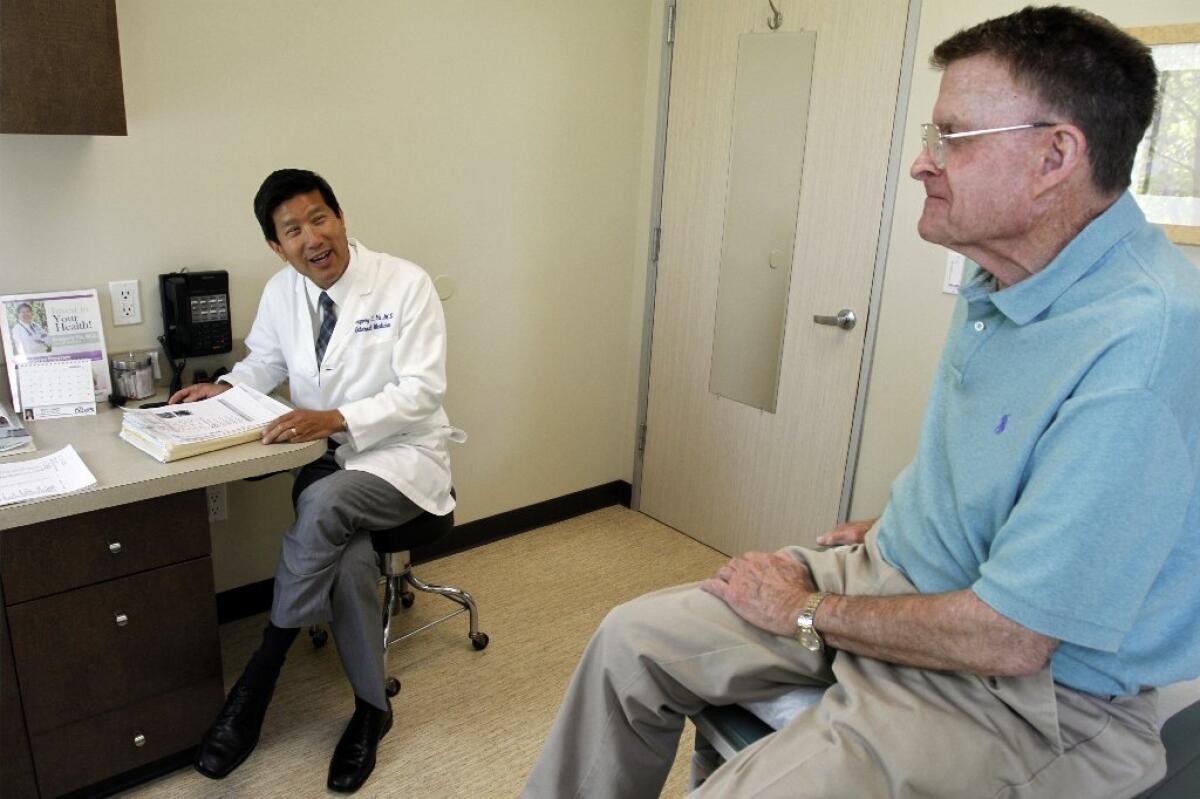Should doctors be allowed to ask patients about their gun habits?

Physicians acknowledge that they ask their patients questions that, in any other context, would be considered nosy and meddlesome.
They expect to get some pushback. But when physicians in Florida ask whether a patient -- or a young patient’s parent -- has a gun in the home, they are now bracing for a call, and possibly a letter of discipline, from their state’s medical board. Physicians in Indiana and Texas are on notice that for them, too, such questions may soon be limited by law.
Since 2011, Florida has had a law on its books that restricts physicians from making routine inquiries about gun ownership and the storage practices of their patients or their patients’ legal guardians. The state legislatures of Indiana and Texas are currently considering similar bills.
The state of Florida, backed by the National Rifle Assn., has asserted that gun owners need protections from “irrelevant inquiry and record-keeping by physicians regarding firearms.”
But Florida’s law is now at a legal crossroads, and the Journal of the American Medical Association this week weighed in to suggest that when physicians ask their patients about guns, they’re just doing their jobs -- and exercising their First Amendment rights to speak freely.
In a “Medical News & Perspectives” article published online in JAMA on Wednesday, JAMA newswriter Briget M. Kuehn brought physicians up to date on a court ruling that may reverberate through medical practices across the country: a July 2014 court ruling upheld the 2011 Florida law; but the U.S. Court of Appeals 11th Circuit has been asked to reconsider that ruling.
------------
FOR THE RECORD
May 12, 8:59 a.m.: This article identified a JAMA newswriter as Briget M. Kuehn. She is Bridget M. Kuehn.
------------
After the Florida bill was signed into law by Gov. Rick Scott in 2011, several physician groups sued to block its implementation. The American Academy of Pediatrics, American Academy of Family Physicians, and state chapters of the American College of Physicians argued that gun-safety counseling is a physician’s legal and ethical obligation to his or her patients, and that the 2011 Florida law infringes on physicians’ and patients’ freedom of speech.
They won a preliminary injunction from a federal district judge in Atlanta. But last July, a three-member panel of the Court of Appeals 11th Circuit Court found Florida’s law to be “a valid regulation of professional conduct that has only an incidental effect on physicians’ speech.”
With support from the American Medical Assn. and the American Bar Assn., the physicians groups have asked all nine judges of the 11th Circuit Court to review its panel’s earlier ruling.
A national survey conducted in 1997 for the Justice Department found that more than half of firearms in private hands were stored unlocked, and 16% were stored unlocked and loaded. That information is certainly dated (largely because the U.S. Congress put tight strictures on the use of taxpayer funds for gun research). But few doubt that if more guns were stored in locked cases, separate from ammunition, the result would be a decrease in firearms injuries, which in 2009 sent 20 kids to the hospital every day and claimed the lives of 453.
Physicians’ groups are growing increasingly restive about gun violence as a public health issue. Both in the public debate over guns and in private consultations with their patients, theirs is thought to be an influential voice.
According to a 2003 study, two-thirds of patients who were counseled briefly about safe-storage practices by their doctor reported that they stored their firearms locked, unloaded and inaccessible to children. Among gun-owning patients who got no such counseling from their physician, only a third said they followed such “triple safe” gun-storage practices.
The Florida law includes an exemption that allows a physician to inquire about guns in the home if he or she “in good faith believes this information is relevant to the patient’s medical care or safety or to the safety of others.” But physicians believe even with this exemption, the law would have a chilling effect on physicians’ inquiries and their willingness to counsel patients on safe gun practices.
“When questions are relevant to the health and safety of the patient, physicians should ask the questions, because that’s what the practice of medicine is all about,” Dr. Garen Wintemute, an emergency physician and gun-injury researcher at University of California Davis told JAMA.
If the July ruling by the 11th Circuit Court of Appeals panel stands, physicians fear not only that Florida doctors will shy from counseling their patients about guns: they worry too that Indiana and Texas will adopt similar laws, with some others following suit. Three other states -- Montana, Minnesota and Missouri -- already have weakened versions of such laws on their books, and measures have been introduced and failed in eight other states.
Follow me on Twitter @LATMelissaHealy and “like” Los Angeles Times Science & Health on Facebook







